#there's always an ideological and traumatic barrier between them
Explore tagged Tumblr posts
Note
I know so many people are Hayley and Elijah shippers, and I don't know where you stand, but I loved Elijah and Gia the most. She not only matched him with wit and sarcasm, but I felt like she was able to get him to let loose and be more himself. Just my opinion.
I have a lottttt to say about Elijah's lovers, so I'm going to make a list and rank them, from least favorite to my number one favorite. (I left out Tatia because we don't know anything about her...)
{6} Antoinette

At first, I liked her. She brought something refreshing to Elijah's brainless lobotomized state. She’s classy, shares his refined tastes, and has this calm, collected demeanor that seems like a perfect match for him. Plus, she’s absolutely gorgeous. But then, her personal philosophy on vampires started showing, and it was all downhill. The whole "purity of the night" nonsense, the way she looks down on humans as nothing but food (fuck that). She claimed she wasn’t like her Nazi vampire family, but her actions proved otherwise. She still practiced their old prejudices and wrapped them in a veneer of elegance to make them seem acceptable. Worst of all, she manipulated Elijah. SHE KNEW WHO HE WAS THE WHOLE FUCKING TIME DIDN'T TELL HIM.
AND!!! Used it all to her advantage. She didn’t love him for who he was; she loved the blank slate he became. So yeah, fuck her, her toxic ideology, and everything she represents.
{5} Celeste
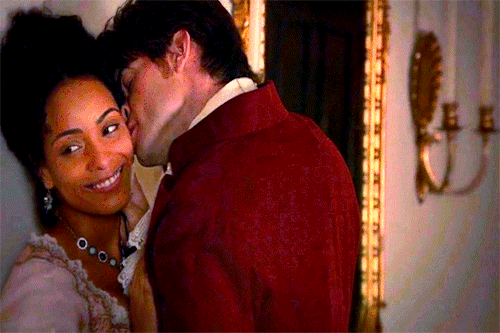
She’s fascinating and so much fun to watch. From the few crumbs we get of their relationship, it’s clear Elijah loved her deeply. Her death broke him, and you can feel the weight of that grief centuries later. But her revenge? Oh, her revenge was everything. The centuries-long scheme, the meticulous planning, the twisted way she channeled her love into hate. It’s such a good trope, and they executed it perfectly. Rewatching the first season, knowing that Sabine was Celeste all along makes it even better. The layers of their history, their unspoken connection, the tensionnnn… it’s all so good. And then there’s the ending. When he kills her, it’s devastating, satisfying, and somehow hot? (I'm unwell)
{4} Katherine Pierce
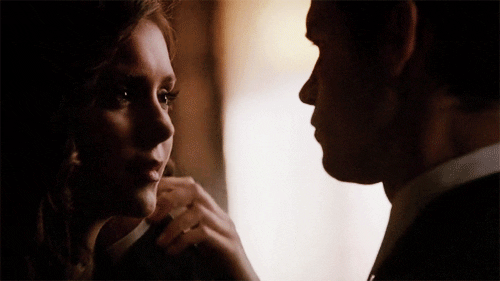
I enjoy their backstory so much. The flashbacks of Elijah and Katherine in TVD are adorable. Those scenes are filled with charm and chemistry, and you can tell Elijah truly saw her as more than just another doppelganger. He admired her fire, her resilience, and her ability to survive even in the face of unimaginable odds. There’s this undeniable magnetism between them, and their early relationship feels so genuine and heartfelt.
But unfortunately, their present-day relationship just doesn’t hold up. Maybe if we’d gotten more of it, I’d feel differently, but I can’t see them working long-term. The baggage between them is just too heavy. Elijah is eternally tied to Klaus, and Katherine has spent centuries being deeply traumatized by him. The pain and resentment she harbors toward Klaus make it impossible for her to fully trust Elijah, and Elijah being the honorable, ever-loyal brother, can never truly separate himself from Klaus. It’s a recipe for disaster.
Beyond that, Katherine’s paranoia, lies, and manipulative tendencies create even more barriers. Elijah values honesty and loyalty above all else, and while Katherine is capable of great love, her survival instincts will always come first. It’s not that she doesn’t love Elijah (I think she does, in her own way) but she’s too guarded and self-serving to let that love flourish. And Elijah, in turn, can never fully let go of his doubts about her.
It’s sad because there’s so much potential there, but the emotional wounds on both sides run too deep. Still, the sexual tension is insane, we’re talking 500 years of pent-up frustration here. Elijah would go until Katherine tapped out. Except, let’s be real…Katherine never taps out. They would’ve burned the world down in the best way, but passion can’t fix their underlying issues.
Their relationship is tragic because it’s built on what could have been.. rather than what actually is. But there is too much pain, too much mistrust, and too many unhealed wounds for them to truly work.
{3} Aya Al-Rashid
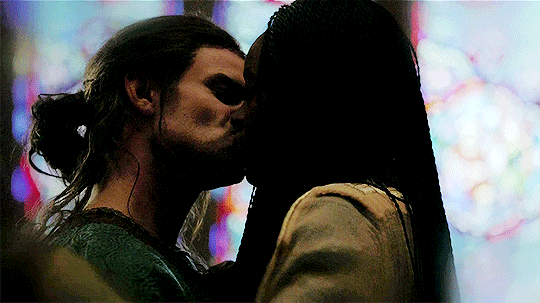
THE MISSED OPPORTUNITY OF THIS RELATIONSHIP WILL HAUNT ME FOREVER.
First of all, I love her. She’s so cool, so badass, so unapologetically ambitious, and so fucking stupidly gorgeous. Every second she’s on screen, she commands attention. The few clues we get about her and Elijah’s past relationship are SO interesting. I think their attraction to each other (beyond the obvious chemistry) stems from their shared ideologies. Aya is the only woman on this list to truly match his intelligence and his vision.
They didn’t just connect physically or emotionally; they connected intellectually. I think they fell for each other over this shared, almost idealistic belief that they could shape the world into something better. Sure, it was a fool’s errand (they were playing gods in a world that thrives on chaos) but their belief in that dream was admirable. And Aya adored him for it. She didn’t just love Elijah; she believed in him, in their shared vision, in what they could accomplish together.
And then he betrayed her. Elijah turned his back on everything they believed in, and it destroyed their relationship. Everything goes to shit after that and their love twists into bitterness and resentment. They end up on opposite sides, trying to kill each other, and it’s just such a tragic mess. There’s this constant tension between them that feels like it’s one step away from either a declaration of love or a blade to the throat. It’s raw, it’s dramatic, it’s the epitome of ‘what could have been.’
I also think her unwavering ambition and refusal to back down made her one of the most compelling women in Elijah’s life. She wasn’t content to follow his lead or play a supportive role. She was his equal, his partner… and that’s exactly why his betrayal cut so deeply for her, and why his regret feels so palpable. Their story could’ve been a fascinating exploration of love, betrayal, and the clash between idealism and reality, but we got just enough to see how incredible they could’ve been.
The missed opportunity of Aya and Elijah will forever make me scream into the void.
Oh Giaaaaa, sweet, beautiful, perfect Gia!!!!!! My only complaint about her relationship with Elijah is that it was cut way too short. It was the beginning of a great romance. She's the only one of his romantic interests to not want anything from him… not his power, not his influence, not even his protection. She loved him for exactly who he is. That’s so rare in Elijah’s life, where everyone else seems to need him to be something for them.
{2} Gia

I adore her so much. She was such a good, pure person, but not in an annoying way, she had an edge to her that made her feel real. I really enjoyed their mutual love of music and how they communicated through it. Those moments between them felt intimate and natural, like something Elijah truly needed to pull him out of the chaos of his life. It’s also worth noting that she didn’t tiptoe around him or treat him like he was above her. She teased him, challenged him, and didn’t let his whole ‘stoic nobleman act’ intimidate her. She made him feel human, something I think he desperately craved but rarely allowed himself to experience.
She was the opposite of him in so many ways, and yet she gave him what he needed most: an escape from all the darkness. I loved how he cared for her too. You could tell she brought out a softer, freer side of him, even if it was brief. I was rooting so hard for them. And her death? So shocking and so fucked up. It was a senseless, cruel loss that still makes me mad. Elijah should have stayed mad at Klaus for longer over it. Honestly, that deserved a real, lasting rift between them. What Klaus did wasn’t just unforgivable….it was a reminder that, no matter how much Elijah sacrifices for his family, Klaus will always rip away the things that bring him happiness.
(Note: I've never been able to decide between Gia or Hayley, so I'm going to go with the woman Elijah would choose.... And we allllll know who that is...)
{1} Hayley
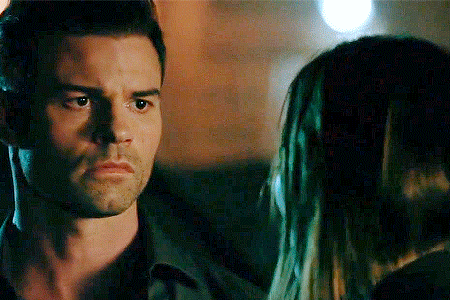
I've seen a few posts saying they have nothing in common, but I completely disagree. They're both fiercely loyal and protective of their family, they're both very sarcastic, and they're both incredibly selfless. (Sometimes to a fault). They share this inner strength, this unshakable moral core that makes them perfect equals. Hayley isn’t intimidated by Elijah’s formality or his calculated nature, and Elijah respects Hayley’s independence and fiery personality. They challenge each other in the best ways.
And let’s talk about how she brings out the best in him. Hayley amplifies all his most admirable traits (his self-control, his honor, his loyalty) but also gives him something he’s never truly had: someone to fight for him. And Elijah gives her what she’s always needed: unwavering protection and support… the kind she never received growing up as a orphan. He respects her agency and defends her fiercely, often putting her safety and happiness above everything else. The way he looks at her… like she’s his entire world… is just *chef’s kiss*.
Their love was so beautiful, pure, and genuine. It wasn’t riddled with manipulation, lies, or selfishness. The only thing that kept them apart was outside interference (*cough* Mr. Niklaus Mikaelson *cough*), not interpersonal conflict. That’s rare in Elijah’s love life, where external drama and loyalty to his family usually ruin everything. But Hayley managed to become both for him. His heart and his family. She’s the only person in his one thousand years who did that, and it’s why I believe he loved her the most.
Her death (and his role in it) was absolutely devastating. The guilt and heartbreak shattered him. She wasn’t just someone he loved; she was his hope, his redemption, and losing her left him broken in a way he never recovered from. Their love story is one of the most tragic yet beautiful parts of the show.
#elijah mikaelson#the originals#the vampire diaries#tvdu#tvd#lissa responds#klaus mikaelson#katherine pierce#hayley marshall#haylijah#gia#gilijah#kalijah#celeste#Aya Al-Rashid#antoinette
36 notes
·
View notes
Text
So, we don’t really know how non-traumagenic headmates actually come about in the brain, scientifically, but we could try explaining how it felt for us!
So, basically, before she was plural, our host was a singlet for 18 years. No plurality-related experiences before that at all, not even any dissociative ones. But she was always lonely, in some way, shape or form.
She stumbled upon tulpamancy before but was scared to try it at the time, but then she found it again at 18. We’ve got ADHD so we have some impulse issues, but she thought it through enough, and so she tried making a “tulpa” (we don’t use the tulpa language anymore, but that’s what she thought of at the time) out of curiosity, excitement and the possiblity of having a new friend.
Well, it happened very quickly – she started talking to an imaginary girl until said girl started talking back on her own. Said headmate grew more and more established over time. The main idea was “talk to the void ‘till the void talks back”. She then went through a crisis when it hit her that she’d be sharing life with her (she knew it cognitively but not emotionally, I think) and, after an argument, they stuck together and are the best of friends now. Later on, her headmate asked for another headmate so that it would be more balanced between them all, and he appeared! Also pretty quickly.
Later on, these two headmates decided that they want to bring another headmate to their group, the final one this time. He is pretty cool! It started overwhelming our host, since 4 is twice as much as two, but they’re the best of friends now too!
All of our other headmates weren’t created by us – they just kind of appeared due to splits (¿) and other shenanigans. For example, one of our headmates was an age-slider and after that weird incident where we couldn’t reach him, he wasn’t anymore. Then, 4 new headmates appeared, the 3 of them (including me) being the ages he used to age-slide to specifically, though we only realized that wayyy after the fact. The split wasn’t due to anything traumatic at all, it was just random. Yet another headmate appeared later on his own as well.
Honestly, we love and care for each other, but we just have a feeling that our brain is dead-set on messing with us without our consent. There were times where we thought that our system collapsed (due to nothing!!! Nothing at all, just one day it went *poof*!) and our host was panicking very badly. What helped us then was the knowledge that all these neuron pathways/connecitons in our brain that constitute us were built over months wouldn’t just disappear in an hour. Eventually, we all came back! :] But yeah, that was terrifying. There were other instances where our brain wanted to make some headmates split for some reason? Or fuse? It didn’t happen (thankfully).
Our host has been doing way better since we came into her life, it feels. We convinced her to get some mental health stuff checked out, she stopped being touched-starved anymore (phantom hugs work to alleviate that for us, thankfully!) and she doesn’t seem to be so self-negative all the time – when you have somebody else there who loves you and cares about you, they won’t let you hurt yourself without intervening. "Do you think I deserve to be bullied? Then you shouldn't be bullying yourself" – a quote from one of our headmates.
Sure, we had some arguments but they don’t last forever. It helps that we all don’t have amnesia barriers, so even ideological stuff can be talked about easily with everyone. Everyone has a voice and nobody forces anybody to be anybody – and never had. It’s nice that we can always switch with somebody when we’re overwhelmed. One time, our headmate was experiencing anxiety that made his stomach ache and, after he switched with someone else, the stomach ache was gone and we could go to sleep. Other time, one of us felt like crying and another one stepped in to handle it instead.
I think what really helps us not feeling like we’re missing out is the fact that we’re monoconscious. Meaning, that there is no time where you just stay in headspace, missing out on life and watching somebody else controlling the body. At all times, instead, we have only one perspective – that of the current fronter – through we experience the world. It just changes “flavours” (identities). So, we’re always living life fully – it just changes who we are at the moment.
In the end, we love each other dearly and our host has said “I am really glad that you’re in my life. I don’t know who I would have been without you. Thank you so much, I love you all”, so I don’t think she misses the singlet life at all :]
Storytime!
Hey, non-traumagenic systems, how did you become plural?
My system is trying to think of how plurality can be formed outside of trauma experiences and we're finding it difficult. Like, why would you willingly want to be plural when you can have a whole life to yourself, but also why not be plural for the beauty of it?
So I'd love to hear some of your stories and get a wider perspective! /gen
36 notes
·
View notes
Text
I’m feeling a whole S4 rewatch comin on...
#i put on paradise found in the background and - omg#how do people hate this episode i really don't understand#there's this thing about x/g that i love so much bc it hurts so good#that they love each other so much but it's not always enough#they see each other in pain - particularly x sees g in pain - and she KNOWS she can't help#both bc of who they are and the things holding them back as individuals and bc of the things they've been through together#*cough the rift cough*#that make it IMPOSSIBLE to get close enough or understand#there's always an ideological and traumatic barrier between them#and it gets bigger the longer they're together#and the longer and more they love each other#and they can't breach it#my god it's so good#it's SO GOOD#and to have all of that situated in this very sexy episode#with sexy wet wound tending and naked candlelit bath massages and oh i pulled a muscle let me undress you to rub it out massages#at the same time as xena is staring agonized at gabrielle bc she can't help and she knows it#at the same time xena is FREAKED OUT AS HELL about the violent part of her#and specifically the inevitable potential of it hurting gabrielle (again)#this episode is a lot!!!!#y'all!!!!#it's so fucking good!!!#and bc I'm MIFFED about it i'm gonna say again that if you're put off the WHOLE THING by xena's stupid hair and teeth at the very end#you are not watching this show correctly#and you're missing out on 90% of what it's doing#there i said what i said#and what i was too tired to say last night#xena
54 notes
·
View notes
Text
Adora, Catra & Trauma (Pt3)
(Part 1) (Part 2) (Part 4)
Full Show
An Analysis of the way Catra & Adora are affected by their respective traumatic experiences.
Relationship To Primary Abuser
Catra
Catra bases her identity around Shadow Weaver second only to Adora in power she has over her emotional states. Shadow Weaver abused Catra for essentially her entire life through psychological, emotional, and physical ways. We see her use her magic to immobilize Catra, terrorize her, and physical grab Catra throughout the show.
Starting from a young age she insulted and degraded Catra and said Catra's worth is based on rather Adora wants her. A key quote stated in Promise (1x11 )
Shadow Weaver:“You have never been anything more than a nuisance to me! I've kept you around this long because Adora was fond of you, but if you ever do anything to jeopardize her future, I will dispose of you myself.”
I believe this sets up the main dynamic better than anything.
Catra sees herself as worth nothing to Shadow Weaver, as only existing in relation to Adora and as always under threat. Catra deeply internalized this view of only mattering in how she measures up to Adora but continuously wanted to be more than a nuisance to Shadow Weaver. Catra is constantly pulled when it comes to shadow weaver between wanting love and being afraid, the essence of her disorganised attachment.
Up until Catra gained the right-hand man status to Hordak she was consistently in fear of Shadow Weaver. And afterwards, she didn't stop basing her worth on Shadow Weaver's perceptions.
Starting in season one Shadow Weaver and Catra show a mostly typical older child and abusive parent dynamic. Catra is willing to test boundaries but only so much. In The Sword pt 2 (1x02 ) she says
Catra: “Shadow Weaver is freaking out. It'd be funny if she weren't such a terrible person ”
showing she has accepted and can have humour about the situation. This continues for a while in The Beacon (1x10) we see dissonance all at once saying she doesn’t need Shadow Weaver, seeks her approval, and even tries to offer comfort to Shadow Weaver.
In Light Hope (1x12) we see the first milestone in this dynamic with Catra overtaking Shadow Weaver in the social hierarchy. However, this doesn’t change the fact that Catra still feels a need to be close to Shadow Weaver and to base her value off of her. She continuously goes to talk to Shadow Weaver to try and prove she’s become better but only ends up with Catra subjecting herself to more of Shadow Weaver’s abuse.
In Signals (2x03) she bases what she should be doing off of what Shadow Weaver would have done.
Catra “I bet Shadow Weaver didn’t have to deal with any of this"
After this she goes to Shadow Weaver for the answers. Her stated autonomy isn’t present and we see Catra still seeing Shadow Weaver as the proper adult.
One of the most impactful moments takes place in Light Spinner (2x06). In this episode, we see Catra deeply needs Shadow Weaver to love her and is protective over her mother. We can see Catra’s fear and unresolved attachment needs from her childhood fighting over how she should act. She has spent this season setting and then breaking her boundaries due to deeply wanting to be loved and respected. Catra is easily manipulated by Shadow Weaver’s semi-kind words and some of the only soft-touch she gets [before reuniting with Adora in season 5].
When Catra confronts Shadow Weaver Catra asks the questions every abused kid wants to ask:
"Why was I treated like that?" and "why was I never good enough?"
Shadow Weaver's response is one that is so common and destructive. "I suffered, so I think that’s what you ought to as well," and “You were never as good as your sibling” or in this case Adora.
Catra rejects some of this explanation and then returns another abused child question: "what could I have done? I was just a kid"
Shadow Weaver mostly brushes this question and Shadow Weaver maintains her power by knowing her child so well. Shadow Weaver hits where it hurts, pointing out that she's being made second best and replaced again. She plays on Catra feeling less than and being so scared of being abandoned to get what she wanted, a way out. This breaks Catra's resolve strongly; we see her spiral through hypervigilance, anxiety and depression.
We see how much this affected Catra when Adora’s explained Shadow Weaver went to the bright moon in Once Upon a Time in the Waste (3x03 ). Catra interprets this as Shadow Weaver abandoning her for Adora triggering a dissociative episode and leading into her suicide/homicide attempt.
The next time we see them together is in Failsafe (5x11) . Catra’s immediate reaction to her being there is to move into hyperarousal of fight mode and then into flight and freeze. She is afraid and angry still, but she has finally put up more of a barrier, however, her presence still causes Catra to fear the loss of Adora.
Catra is deeply triggered by the touch of Shadow Weaver and it leaves her in a state of heightened flight response. This experience also brings out her older protective instincts we saw in season 1 and late-season 2 due to the way she knows Adora can get hurt like she’s been hurt by Shadow Weaver. Catra overhears what she thinks is Adora giving into Shadow Weaver setting up the next set of actions in The Heart pt 1&2 (5x12-13) . Causing Catra to leave due to the manipulation she knows she’s experiencing.
When they next meet Catra is fully able to stand up to her stating it was no longer about her, a very strong statement. Even if she is still clearly hurt by the abandonment. Shadow Weaver is willing to help due to complex reasons, wanting to save the world as that’s the “side” she chose, and some degree of responsibility for her daughters even if it's twisted and more about performing and then anything resembling love. Catra is affected by this crying at the loss of her mother. We don’t get to know much about this fallout but it would be as complex as the history of adult children of abusive parents usually are.
Adora
Adora's relationship to Shadow Weaver, her mother and commander, is characterized by manipulation, fear and agitation. Shadow Weaver made her the golden child, the next hero and leader, responsible for others way too early and as an object to be used for power. All of these became the core ideas and schemas that Adora built her life on.
Adora lacked direct physical/magical abuse from Shadow Weaver but experienced a severe psychological and emotional abuse. An example is her being forced to watch and being blamed for the physical/magical abuse of Catra (Promise 1x11) . During their childhood, we see that the abuse worked to internalise the views of shadow weaver which gave Shadow Weaver an intense and continuous force in her life even when not present.
In The Sword pt1 (1x01) we see how Shadow Weaver wanted her to be the next force captain and believed her to be the best of the children she raised. We can tell Adora wanted to be the best having internalized these desires. Adora believed what she was taught wholesale on the ideological front as well and losing that belief when seeing the harm of war causes the first rupture in her connection to Shadow Weaver.
In the Shadows of Mystacor (1x07) has a few key moments. One is Adora admitting Shadow Weaver did “mom stuff” which shows Adora understands Shadow Weaver as her primary attachment figure, ie the mother. Another key moment of this episode is Adora rejecting Shadow Weaver’s control for the first time. She verbally states her autonomy, affirms that the pain is not her fault and that Shadow Weaver shouldn’t get to decide her life. Adora physically fights Shadow Weaver off and protects her new life, something that is one of the most powerful moments in their relationship. This is a rejection of not only her abuser but the life she was taught to want. She is choosing a new healthier life. This is solidified in after the confrontation she allows her friends to support her.
In No Princess Left Behind (1x09) Adora is physically assaulted and violated mentally by her mother figure. This is an attempt to try and bring her back under control. Something we know she has been trying to do this whole time, a very visceral moment of how much Shadow Weaver believed she owned Adora. This is a harsh and traumatic event for Adora.
We don’t see them interact together fully until The Price of Power (3x01). We see Adora be willing to help Shadow Weaver both due to her ingrained responsibility and she doesn’t want to see her mother figure die. Adora also needs to know what’s going on and Adora is scared to not have some control in the situation. This fear of being out of control brings Adora to interact with her abuser.
Adora is also more confident that she won’t be directly manipulated anymore. She has learned most of Shadow Weaver's tactics and isn’t vulnerable enough for them to work. The conversation they have here shows this personal growth Adora has experienced.
Shadow Weaver: “I knew you were different. You were...”
Adora: “- Special? No, what you always told me was that I didn't matter. I was special only as long as I obeyed you.”
However, the conversations between them also break the precarious hold on some sense of self Adora gained over the past through SHadow Weaver revealing she is a first one. This adds self confusion and distances her from others. This is important because her connection to others is the most powerful grounding tool Adra has learned to have.
Throughout this season Adora is continually agitated and stressed about Shadow Weaver being allowed in her safe space of Bright Moon. In Pulse (4x04) we see Adora be upset about Glimmer having asked for magic help from Shadow Weaver. She is understandably afraid of Shadow Weaver’s power and is scared of losing another friend to the damage Shadow Weaver caused. Shadow Weaver is a walking trigger to her childhood trauma leaving her implicit memories of shadow weaver as a figure of pain, magic as bad and both as a threat to friends on continuously.
In Princess Scorpia (4x06) Shadow Weaver continues to cause problems for Adora even when not there as her Black and White thinking on magic and will to keep shadow weaver from having control feed into the relational struggles Adora and Glimmer are having.
In Mer-Mysteries (4x07) we see Adora and Shadow Weaver interact and Adora is sure that Shadow Weaver is the spy and is in deep pain over the fact she believes she is hurting Glimmer. However, we see them take Shadow Weaver’s advice because even Adora can admit Shadow Weaver is great at manipulating others.
We see their next big moments in Failsafe (5x11) Shadow Weaver is willing to use Adora as a tool again, just like she had done her whole life. Shadow Weaver also works hard to break down any sense of autonomy Adora has and her newly healed connection to Catra, someone who would push back on Shadow Weaver in the most knowing way. These acts are harmful and while Adora tries to push back on Shadow Weaver multiple times the painful truth is that Shadow Weaver still has a power over her. While her attempts to use the comfort/assault patterns fail, Adora does need to try and save Etheria so the internal and external objectification continues.
In Heart pt 1 (5x12) we see Adora talking with the mirage of Mara. Mara is trying to get Adora to want to stay alive, to have self-worth, to take her own needs into account and to give herself grace. Adora herself is arguing back that she doesn’t have value on her own, she only matters in how she can be useful to others. Adora’s words echo Shadow Weaver of her having to be She-Ra and that she should be willing to die for it. Adora’s carrying this self-harming objectified view within her and it’s so defining of their dynamic.
This story ends in Shadow Weaver’s death, a complicated moment where Adora is clearly devastated by what happens and was almost helped by Shadow Weaver to be able to use the failsafe. The complications show through in her losing her mother, almost dying herself, and in an abuser doing one nice thing. This moment is complicated visually, narratively and relationally and is a good incapsulation of the lack of resolve abusive relationships with adult children can feel.
[A Word on “redemption” of Shadow Weaver
I don't believe shadow weaver is redeemed or a good person for her sacrifice. I think her reasons were complex but I don't believe she has ever had or a healthy love for her "daughters". I don't think we should consider this worthy of having forgiveness for her actions based on one singular action. Once action doesn't outweigh years of abuse and trauma.]
#acat#fandom:#she ra#topic:#abuse and media#trauma and media#relationships#family#type:#my post#txt#character:#Shadow Weaver#Catra#Adora#ship:#shadow weaver & catra#Shadow Weaver & Adora#Shadow Weaver & Catra & Adora#cw:#child abuse#emotional abuse#physcial abuse#other:#she ra meta#catra meta#adora meta#shadow weaver meta#she ra analysis
24 notes
·
View notes
Text
Clarke + Manipulation Part 2: Bellarke
the (less shippy) Part 1: Clarke + Manipulation
Okay so there is a lot of controversy in different corners of fandom regarding the presence of manipulation in Bellarke’s relationship. We’ve all scene the ridiculous accusations, of course, but even within our own fandom I feel like sometimes we take certain interpretations for granted without really interrogating them. Luckily, I love self-interrogation and talking about Bellarke so strap in.
There are 3 primary narrative reasons that I think Clarke doesn’t manipulate Bellamy pretty much at all compared with other characters, and some of those reasons may be obvious, so bare with me: 1) as the seasons progress, any attempt Clarke makes to manipulate Bellamy would be and are not very effective (this is prominently demonstrated in the narrative) 2) it doesn’t make sense for Clarke to manipulate Bellamy because she really values his input, even (especially?) when he disagrees with her, and 3) perhaps most importantly, Clarke has VERY LITTLE incentive to manipulate Bellamy because they are almost always ON THE SAME SIDE. Manipulation is primarily a tool you use to, as we see in the definitions in part 1, twist someone else’s priorities into your own (which can’t happen if you have the SAME priorities) or employ deceit of some kind to influence someone’s decision-making. Basically: persuasion isn’t manipulation, no matter how good you are (Clarke is) at it. Persuasion is something that is very prevalent in Bellarke’s relationship when it comes to discussing how best to achieve their mutual goals, but even messy or emotional persuasion is not the same as manipulation.
Ok, now to touch on fandom interpretation, which I’ll also address when I look at the scenes below. There are several reasons I think fandom overestimates the amount of “manipulation” in bellarke’s relationship (outside of sheer making shit up), and those are 1) confusing “manipulation” with “telling the truth and that truth bringing about the reality you want” 2) not really examining Clarke’s intent or awareness with certain actions/word and 3) misconstruing hurting someone as manipulating them.
This brings me to the 2 scenes I want to talk about! Finally! Okay, so the fact that Clarke manipulates Bellamy less than others doesn't mean it’s something that’s never present in their dynamic. There’s a couple big scenes that people talk about and have strong opinions about that I think are really important to talk about here. So I’m going to go in chronological order.
#1 - 2x09: “It’s worth the risk”
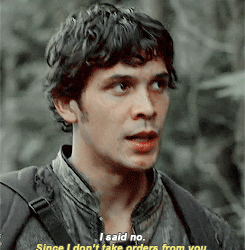
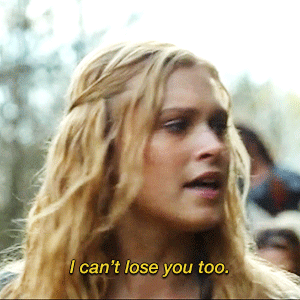
(x)
I’ve thought about bellarke’s story in this episode A Lot and whether it’s an instance of Clarke manipulating Bellamy, because it seems like a lot of fandom throws this episode around as “proof” that Clarke is willing to - to whatever degree - use Bellamy as a tool/manipulate him for her purposes, etc. But honestly, I ultimately just don’t see it that way, and I don’t think the narrative supports that interpretation.
To be honest, the scene above is the closest Clarke comes in this episode to being “manipulative.” She says “I can’t lose you too” because she knows it will end the discussion immediately. It also has the added benefit of being completely true: in that moment, Clarke has a knee-jerk panic reaction at the thought of Bellamy abandoning her and says the thing she knows will get Bellamy to agree with her, or at least to not fight her on it. This is something Clarke does A LOT, especially with Bellamy - employ the Truth to it’s most potent effect. But I think it’s something that people confuse with Clarke being “manipulative,” which isn’t the case, because she’s being transparent af.
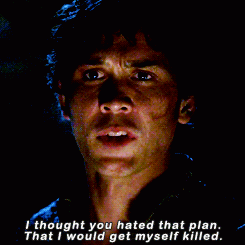
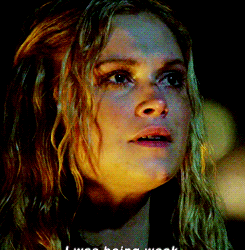
Originally posted by fyeahbellarke
This is the part of 2x09 that I see thrown around a lot as “Clarke being manipulative” or “Clarke using Bellamy” and it’s one of the reasons I wrote this meta because THAT COULDN’T BE FURTHER FROM THE TRUTH. The ONLY person Clarke is playing here is herself.
Let’s think about where Clarke’s head is at in this episode. She’s just killed a person she loved in order for skaikru to get this alliance that it needs to protect itself and save her friends. For Clarke, that decision had symbolic significance as well: shedding her personal feelings and sentimentality in order to put the group first. Throughout 2x09, her choice is validated implicitly by the fact that the move worked - they have their coalition - and explicitly by L.exa, who takes one step farther than Clarke had taken the night before by openly declaring that “love is weakness.” So the whole episode is Clarke really coming to embrace the “love is weakness” ideology in a way she hadn’t with Finn - remember she tried to save him MANY times (despite the odds) before she had to kill him in 2x08.
Early in the episode, when Bellamy offers to go to Mt. Weather, Clarke’s knee-jerk reaction against losing him comes to the fore and she shoots down the idea, and Bellamy backs off. But the thing is, Clarke has no reason to think that Bellamy has stopped thinking that the “inside man” plan is the best possible plan - in fact, the audience doesn’t either! Literally the only reason we’re given as to why Bellamy drops the inside man idea is because he’s respecting Clarke’s feelings for him. So, at the end of the episode, when Clarke finally embraces the “love is weakness” ideology completely, she realizes that it was her love for Bellamy that was holding them back from executing the best plan possible to save their people (because the inside man plan is presented by the narrative as simultaneously a suicide mission but also the best plan they have). So Clarke thinks, having removed the impediment of her feelings, she can just let Bellamy go like he already wanted and had planned to, despite the fact that she’s afraid of losing him.
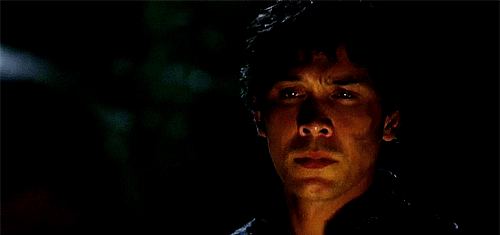
(x)
And this is where we get into controversial territory. I think people interpret this scene in a way that casts a negative and inaccurate light on Clarke because we are looking at the scene from the perspective of Bellamy’s hurt feelings, which are clear through Bob Morley’s performance. WE know that it meant a lot to Bellamy to hear Clarke say “I can’t lose you too.” WE know that maybe those words made Bellamy feel like maybe he wasn’t expendable, at least not to her, and that when she takes them back it cuts deep. But the thing is, Clarke breaking Bellamy’s heart =/= manipulating him. And it doesn’t equal her thinking of him as “a tool” or a subordinate either because Clarke is not ORDERING Bellamy to go; she literally says “you were right” - she’s agreeing with his earlier plan. And as far as the argument that Clarke intentionally hurts Bellamy as some back-door way of manipulating him into leaving - that doesn’t add up because there’s no evidence that Clarke KNOWS ANY OF THIS or conceptualizes her decision in that way AT ALL.
Clarke does not know the profound damage she’s doing to Bellamy’s heart in that moment - and honestly how can we expect her to? 2x09 is arguably the episode in which Clarke is the most traumatized in the whole series - she is literally seeing ghosts - and she can barely look Bellamy in the eyes the entire ep. As crazy as it may seem to us, the audience, Clarke really has no idea how much she means to Bellamy in general (up until now she’s initiated all intimacy between them, he just reciprocates) and in this episode in particular, she is so consumed with stopping up her own overflowing feelings that she doesn’t question her assumption that Bellamy likely sees her “I can’t lose you too” as an impediment to him completing a necessary mission.
So Clarke telling Bellamy that he was right and that he should go into the Mountain is not some kind of cleverly crafted emotional manipulation meant to get him to do what she wants. Clarke fools herself into seeing it as overcoming the artificial barrier she had put in place earlier in the episode (her feelings for him) and allowing him to carry out the mission he himself proposed so that they can achieve their mutual goal of saving their people. She sees it as not letting her own feelings for Bellamy get in the way, and so she says, “you were right,” and reverts back to his initial plan.
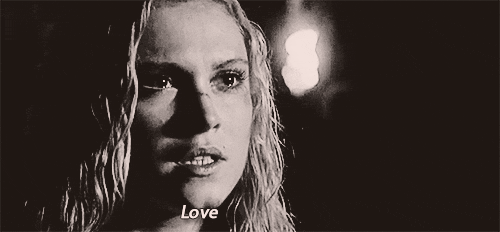
I hope I’m not coming off as preachy or anything, but it was important to me to explain how I - and I think, the narrative - is framing this scene. Which is as a traditional tragedy - as in, a tragedy borne from misunderstanding. The tragedy is twofold: Clarke thinks her reigning in her feelings is doing everyone a favor by allowing her to address the problem at hand, but she doesn’t know how much she’s hurting Bellamy by sending him away. On Bellamy’s part, he thinks that Clarke’s dismissal is a true reflection of her feelings for him - and her feelings about his usefulness/disposability. He can’t see her internal battle - she hides it from him the entire episode despite him constantly being by her side. So both of them are looking at the same situation and coming away with different understandings that hurt them in different ways. This is not a scene that victimizes one over the other, rather one that ratchets up the stakes of their relationship while helping to drive the plot of the rest of the season.
No matter how you read it, this is a devastating scene for Bellarke - it’s heartbreaking for Bellamy and for Clarke and for the audience. But it is a scene that sets up an emotional misunderstanding and reticence between Bellarke that I don’t think is truly addressed until 3x05. It is a scene that places Bellarke’s relationship front and center in both of their emotional arcs going forward, and that’s a beautiful thing. Finally, I think the only way one can come away from analyzing this scene convinced that it’s as simple as Clarke manipulating Bellamy in a way that’s supported by the narrative is if one came into this scene assuming that Clarke already somehow holds the upper hand in Bellarke’s personal relationship, which is honestly antithetical to what the show has been telling us since day one. Other peoples and characters may place Clarke front and center as “the leader,” but Bellarke have, since at least 1x08, related to each other as equals, with Bellamy never taking orders from Clarke. And he doesn’t start in 209.
#2 - 3x05: The Scene
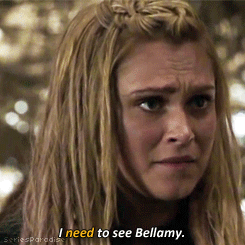
*rubs hands together* I LOVE THIS SCENE. Okay let’s dive in.
So this scene is a biggie that people Freak Out over a lot on both sides of fandom. I’m begging y’all to hear me out for a moment here though while I make my argument. In this scene, for one short moment, Clarke DOES actively try to manipulate Bellamy. However, her attempt is very short and unsuccessful. I’m not trying to attach any kind of moral value to the fact that she tried - there are no perfect decisions in this show and the impasse that Bellarke was at in this scene presented yet another dilemma for both characters. So let’s look closer at what happened.
Clarke comes to Arkadia in 3x05 basically because she cannot imagine a world in which Bellamy is not on her side. She barely seems to hear that he was present for the massacre - all she hears is Indra’s answer when she asks, “how did you survive?” and Indra says, “Bellamy.” Clarke, understandably limited in her perspective because of her estrangement from Bellamy and the sky people over the last 3 months (note Octavia’s “you haven’t been here, Clarke”), does not anticipate that things could have changed so much that he would actively oppose her and what she sees as the peaceful solution.
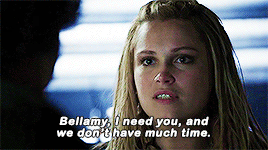
However, within the first few seconds of their encounter, Clarke realizes that the task of bringing Bellamy over to her way of thinking is not going to be as easy as explaining her side of the situation to him. It’s when Clarke realizes that she’s failing to reach Bellamy (when he says “we’ve been at war since we landed”), and that she doesn’t have time to waste, that she feels like she has no choice but to try a line that has always brought them together in the past, though she’s never employed it quite so tactically: “I need you.”
One of the reasons it’s so hard to talk about Clarke + manipulation is because it’s very hard to tell when Clarke is intentionally trying to manipulate someone or when she just says the right thing - which she has a gift for - and where the line between those two things is. But in this case I think it’s pretty obvious when Clarke says, "I need you” it’s both because it’s true AND because she knows it’s worked before to snap Bellamy out of whatever spiral he’s in. Just like Clarke saw in 1x08, Clarke sees again in 3x05 that Bellamy’s hurting deeply and has once again convinced himself that he’s nothing but a monster. So she says the same thing she said then, under that tree. In 1x08 when Clarke says she needs Bellamy it’s because it’s true; it’s that first formative moment where Bellamy’s vulnerability won him her trust and his honesty won her respect and his capacity for good won her affection. In 3x05, she says it because it’s still true, but also because she desperately needs a shortcut to get back to the place where he trusts her, where she can count on him again.
Now let’s talk about why it doesn’t work.
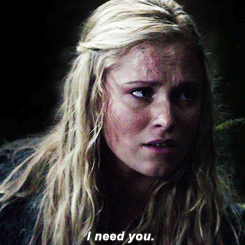
The “I need you” is a very interesting swerve because usually when Clarke manipulates someone, she uses their political circumstances to her advantage or she leverages the other person’s relationship with someone else (ex. L.exa with Anya). But Clarke rarely leverages HER OWN relationship with the person she’s trying to manipulate. But in 3x05, she does just that - but it totally backfires.
Clarke has meant it every single times she's said “I need you” to Bellamy. In this scene, though, Clarke thinks she can get away with saying it again, that she can use it to manipulate Bellamy without hurting herself. But then something crazy happens: Clarke totally plays herself. Clarke is trying to get the upper hand on the conversation when she brings up Mt. Weather, but when she says she needs him, that she “needs the guy who wouldn’t let me pull that lever by myself,” the actual truth of that - that he did that with her and that she does need him, slaps her in the face. She can't even get through the sentence without being emotional, and that's never happened to Clarke when she wants to be in control before. She's the Queen of control in situations like this. But when Bellamy looks so hurt, when he proceeds to throw her own words and his hurt - hurt that is DIRECTLY TIED to the fact that he ALSO NEEDS HER - back at her, it’s too much for Clarke to handle and she immediately quits playing playing any games and just crumples in on herself.
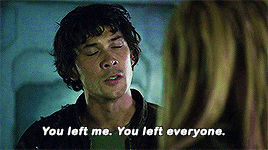
(x)
Despite what some people say, Clarke visibly coming apart at the seems when Bellamy says everything that comes after “You left me. You left everyone,” is, I think, about more than Clarke just (a) crying because Bellamy’s yelling at her (the shallowest of anti interpretations tbh) or (b) Clarke crying because she recognizes the truth in what Bellamy is saying. I do think (b) is at play - Clarke is definitely hit by a truth bomb in this scene, that’s part of why she apologizes - but even more than recognizing her own sins (sins Clarke already KNOWS she committed!) Clarke begins to break down and cry because she’s being faced with how broken her and Bellamy’s relationship is, and by how much the fact that it’s broken affects her.
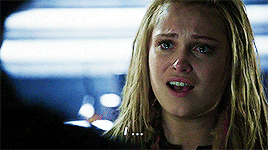
(x)
Clarke is hit by a wave of shock and grief in this scene not only because she didn’t expect Bellamy to be this mad at her, but because she didn’t expect his distrust and anger to hurt so badly. She’s so rattled by this that she can’t even keep it together enough to control the conversation, much less persuade or maniplate him to her side (she can’t even keep her goddamn feet! she’s so shook she has to physically sit down). What this scene says to me is that Clarke can't bring herself to manipulate Bellamy - especially when they're at odds personally, and she misses him. Conflict with Bellamy leaves Clarke way too raw to have enough control to manipulate, which is why this initially political conversation just becomes an explosion of feelings.
But the agency in this scene isn’t all Clarke’s - this is a two-way street. This scene is so intense because Bellamy REFUSES to let Clarke get away with feeling nothing, with manipulating him, and she is surprised by the intensity of her emotional reaction to him. He refuses to let her breeze by the implications of her needing him after she left him - he refuses to let her go on believing he doesn’t need her too! He stops her attempts to manipulate the situation, to remain calm, when he says, “enough, Clarke!” I’m not pointing this out to praise Bellamy - like I said, no one’s right or wrong in this scene, and Bellamy is definitely harsh. But he refuses to let Clarke turn the conversation to their personal relationship when what she really wants from him is political.
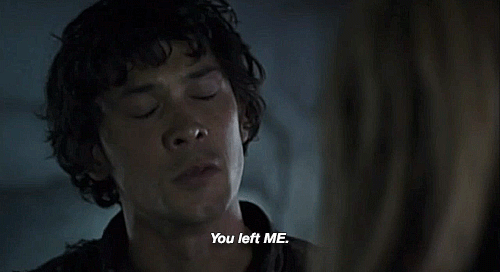
And I think that, to an extent, Bellamy knows what he’s doing in this scene. He knows Clarke, knows her penchant for getting what she wants and saying the right thing. It's why he's so afraid that she doesn't care about him equal to how he does for her: he KNOWS she manipulates people and is terrified deep down that she has been paying him this whole time and that he is disposable to her (a fear that rose to the surface in 2x09). So while Bellamy’s pain in 3x05 is completely honest, he's intentionally throwing it at her hoping something will stick, trying to get her to reveal her own emotions, because he's sick of feeling like he's the only one who has them. It's not manipulation on his part because both of them just know each other well enough to press the right buttons. For me, this is part of why I love this pairing: they are the first to offer each other forgiveness and understanding, but they will hold each other’s feet to fire to make the other “face it” - from Day Trip on through.
When you know someone as intimately and can be as deeply hurt by them as Bellarke can by each other, detached, cold-blooded manipulation is impossible. And this is the scene where Bellamy and Clarke both realize it. It is a huge come to Jesus moment for Bellarke, at least in a narrative sense: it cements the fact that they really can’t get away with being emotionally dishonest with each other anymore, that they are destined to be equal partners in their emotional conflicts from here forward. And 3b totally bears me out on that. Clarke and Bellamy are on even emotional footing for like, the first time ever, in 3b, and I don’t think that’s something that’s going to change as we head into s4.
Conclusion + Preempting whatever shit I’ll prob get for this
So before someone comes at me and says I’m “romanticizing abuse” or even romanticizing a fight scene in some kind of inherently problematic way, I would like to say a couple things. The first is that this scene does not, in my opinion, in any way, constitute an instance of abuse. It’s characterized by Clarke and Bellamy leveling the playing field between them, not a perpetuation of any kind of exploitative power dynamic. Obviously I don’t think Bellamy handcuffing Clarke at the end of the scene is “romantic,” but it’s also a move that is clearly not premeditated and so has no bearing on the (script-confirmed) emotional honesty that comes before it.
The second thing is that I want to encourage all of fandom to get away from the compulsive need to ascribe moral value to all scenes/actions/words that happen in a story. I hate to break it to y’all, but sometimes stories have...conflict. Interpersonal relationships have problematic moments and people hurt each other and just because I can appreciate how extremely painful or messy scenes add depth to or change a relationship does not mean I am romanticizing a scene, or approving of any one character’s actions.
Being socially and politically critical of media we consume does not mean parsing every action by every character as “Problematic or not” or even as “right or wrong” - especially on a show that goes out of its way to make sure there’s no one way to interpret any situation. Being a responsible consumer of television means holding writers accountable when they perpetuate harmful tropes, it means speaking out for better representation and more diverse stories and discussing issues when we see them. It doesn’t mean you can’t enjoy a couple because they’ve had a fight, it doesn’t mean that narratives aren’t allowed to be ambiguous about who’s right and who’s wrong and what’s fair and what’s not.
That’s why there is so much contention about the 3x05 scene - because it’s really up for debate what’s fair and what’s not, who “deserves” what and who was “right.” But the reason I wrote this meta, at least this second part, is to make the point that it doesn’t really matter what percentage of that conversation was “fair” - what’s important about the scene is the emotional depth it gave two characters and the added layer of complexity and history it gives to their relationship.
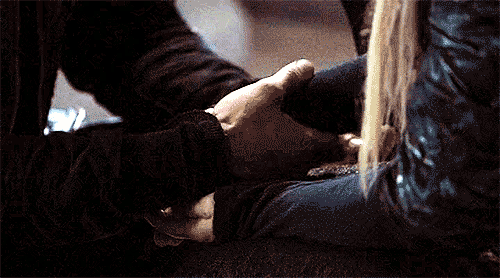
Specifically, what matters to me personally is that this scene convinced me, in an irrefutable way, that Bellamy and Clarke love each other deeply. Qualify that love any way you like, but this scene shows us two people who, in the midst of an extreme and dangerous conflict over their political positions, cannot help but break down over the loss of their relationship with each other - a relationship that they hadn’t realized had become vital to their very beings. They are trying to claw their way back to some semblance of the trust and intimacy they have counted on in the other previously, but there is too much raw hurt and too little common ground to allow them that reconciliation.
So if you made it to the end of this unnecessarily long and probably boring meta, you should know 2 things: you’re a rockstar and bellarke love each other *hits bong* bye folks
#the 100 meta#clarke griffin#bellarke#bellarke meta#bellamy blake#mine#my meta#seriously yall im sorry if this is boring but its how i feeeeeeeeeeeeeel#my inbox is open
333 notes
·
View notes
Text
Paper代写:Theory of illusion
下面为大家整理一篇优秀的paper代写范文- Theory of illusion,供大家参考学习,这篇论文讨论了幻象理论。幻象是精神分析理论中的一个核心概念,往事的回忆总是与无意识欲望息息相关,总是在无意识欲望的影响下不���变换、重塑自身,在这一过程中,幻象扮演了重要的角色,它是无意识欲望上演的场景。后来齐泽克把发端于弗洛伊德精神分析学说的幻象理论用于意识形态分析和批判,他的幻象理论启示人们,我们必须穿越幻象,认识到那种把阻碍社会正常发展的因素归因于某个种族或族群的意识形态只是一种幻象,阻碍社会发展、侵蚀社会肌体的“病毒”不是某种外在、外来的入侵者,而是社会自身的必然产物,也就是社会内部深层的矛盾性与对抗性。
Illusion is a core concept in psychoanalytic theory, which first appeared in Freud's works. In his earlier works, Freud argued that memories of early childhood sexual attraction were sometimes the product of illusions rather than actual traces of abuse. This seems to imply that illusion and reality are incompatible, that illusion is the product of illusion and imagination. Not really. According to psychoanalytic theory, reality is not purely objective. "reality is not an undisputed established existence, in which there is only an objective and correct way of perception, but it is constructed by discourse. The memory of the past is always closely related to the unconscious desire, which constantly changes and reconstructs itself under the influence of the unconscious desire. In this process, illusion plays an important role, which is the scene of the unconscious desire.
Later, pull Kang Jicheng Freud's this view, is the illusion as desire, however, show in the illusion is not the satisfaction of desire, is simply the desire itself, because, in essence, desire is not satisfied or implementation, desire often into the opposite of his, or sliding from one object to another object, never attached to a fixed object. "The basic essence of psychoanalysis is that desire is not given in advance, but constructed afterwards." Illusion provides the coordinate and frame for the subject's desire, designates the object of desire for the subject, and makes the subject learn how to desire. Lacan also highlights the protection and defense function of illusion -- illusion protects the subject, making the subject resist the emasement of symbolic order and the lack of the other. The desire built up by the subject in the scene of illusion is to resist the desire of the other.
Lacan to algebraic expression ﹩ derive a to describe the structure of the illusion, for this formula, we can read: split the body of the desire in a small object with a. Symbol ﹩, refers to the division, hit cross-court subject S. In lacan's view, the subject with independent consciousness in Descartes' proposition of "I think therefore I am" is just a myth, and the subject is essentially an other, which is the result of emasculation after entering the symbolic realm. The symbol ◇ is the combination of two Angle brackets, representing "encirclement -- development -- union -- separation", we can understand as the desire of the subject for the object little a. The symbol a, means little a.
For the object little a, we cannot simply understand it as the object or object of desire, but as the object of desire -- the cause, which is not only the object of desire, but also the cause of our desire. "The object little a is not what we desire and pursue. It defines how our desires move. It is a formal framework that gives coherence to our desires. Desire, of course, is metonymic; It always transfers from one object to another; Through these substitutions, however, desire retains a minimal formal coherence, a set of phantasmal features that we desire when we encounter them on a particular object. As the cause of desire, the object little a is nothing more than this coherent formal framework." Zizek points out here that no real object can fill the inner void of desire, and that any object can be an object as long as it constructs our desire and gives our desire coherence, forming an illusion of formal framework.
The object small a is a remnant of the original pleasure. The so-called primary pleasure, refers to the infant and the mother when the original state of integration. When the baby in the mother's arms, food and clothing, feeling love, for the baby, the mother's arms can be said to be an Eden. The subject is eager to return to the state of unity with the mother all his life. However, due to the castration and repression of the "father law", the subject must give up the desire for the mother and place the desire for the mother in some residual objects to pursue the residual of the original pleasure, namely the object small a. The object little a is both within and outside the subject, and it hangs between the subject and the other. So to speak, because the object model of small a mother's breast, voice, eyes, etc., although these objects to a part of the parent, but because the body always have a kind of illusion, namely, he and his mother together, is a part of the mother, so these objects belong to the mother, also belong to him, both within him, and beyond him, between the subject and the mother.
Object small a is never available to us. From the perspective of space, we can only recognize the face of the object small a by "squinting" it in a distorted way. In terms of time, it can only exist as something expected or lost, only in the form of not yet and no longer, and never in the pure here and now. It's like Achilles' tortoise. You can either stay behind it or surpass it. You can never keep pace with it. Therefore, "objectively", the object little a is "empty". This means that human desire is like a bottomless black hole, which can never be filled and can never be satisfied.
For lacan and zizek, our reality, our society, is supported and constructed by illusion. Illusion is a barrier to the real world, once the illusion disappears, too close to the real world, our mansion of reality will collapse and disappear.
According to zizek, "the symbolic order is constructed around a certain traumatic impossibility, around something that cannot be symbolized, that is, around the reality of the original music." The reason why it is impossible is not that it does not exist or do not happen, but that it cannot be symbolized or expressed by linguistic symbols. Occasionally we encounter the reality, but the encounter with the reality causes trauma; The trauma is so heavy and painful that we can't admit it or describe it in words. One of the functions of illusion is to fill in the gaps in the other, the symbolic order, hide the inconsistency of the other, and shield the traumatic impossibility of the other. Illusion can cover the traumatic reality, so that we have a consistent, coherent perception and experience of the symbolic world and the other. Of course, this experience is of a certain illusory nature.
In order to explain the construction and support of illusion to reality, zizek quoted the fable of zhuangzhou's dream butterfly analyzed by lacan in the four basic concepts of psychoanalysis. In one day, zhuangzi's idea on the idea of even things is an idea. "in one day, zhuangzhou dreamed an idea just like a hu butterfly. Russia's natural sleep, QuQuRan weeks also. I wonder if zhou's dream is hu die and hu die's dream is zhou with? Zhou and hu die, then must divide. This is objectification." As for this fable, we can't just interpret it as "life is a dream". Its real ideological connotation lies in the fact that it represents the experience of zhuangzi in his dream and his desire. Zhuangzi and butterflies can be expressed as the relationship between ﹩ derive a, means: chuang tzu thought the butterfly. In reality, in the symbolic world, zhuangzi is of course a person rather than a butterfly. The butterfly is zhuangzi's desire object, which constitutes zhuangzi's illusion -- the framework and structure of identity. However, in the real world of zhuangzi's desire, he is a butterfly dancing without desire. Therefore, we can say that in the real world, zhuangzi is a "real" butterfly; Only in the reality supported by illusion and symbolic order, zhuang zhou was a man. The reality of zhuangzhou as a social person is constructed by the illusion of "zhuangzhou dreams butterfly". If zhuangzhou is too close to the object butterfly of desire, it will lead to the collapse of reality and the collapse of personality.
The unfortunate career of Jonathan hogg, a famous science fiction by heinlein, an American science fiction writer, reveals the illusory nature of reality and the shielding effect of illusion on the real world. At the end of the novel, Jonathan hogg, a mysterious character, tells the randalls, a private investigator, the truth about the universe: the current universe was created by some mysterious species, and there are many similar universes. He himself is a critic of this universe. He discovered several flaws in the universe that he will fix in the next few hours. He warned the detective couple not to open the window of their car on the way back to town, whatever happened, so that they would not notice anything. Hogg closed his eyes and did not wake up. On the drive back to the city, the detective and his wife were initially restrained, but when they saw the policeman on the side of the road, they finally decided to open the window and report the location of hogg's body to the policeman. However, "outside the open window, there was no sunlight, no police, no children -- nothing. Only a grey, invisible mist was moving slowly, as if it were the beginning of chaos. Through the mist they could not see the city ahead, not because it was too foggy, but because there was nothing behind it. There was no sound in the mist, no sign of movement."
In zizek's view, the chaotic world outside the car window is actually the realm of reality; The sunny and busy real world we see through the car window is just a kind of fiction. The car window serves as a barrier separating social reality from reality. The consistency, the coherence, of our hard reality is only an illusion, and at any moment the real world may overflow into reality and be absorbed into it. Once the realm of reality invades reality, the edifice of reality falls apart. "This is the picture that psychoanalysis provides of everyday reality, of a fragile equilibrium. When trauma strikes in an accidental, unpredictable way, that fragile equilibrium can be broken."
To illustrate the obscuration of the real world by illusion, zizek also cites the case of the "burning child" dream explained by lacan in his lectures on the four basic concepts of psychoanalysis. This is an example from Freud's dream interpretation.
A father stayed at his child's bedside for days and nights. When the child died, he went into the next room and lay down, but the door was open so that he could see from his bedroom the room where his child was lying, with tall candles burning around the body. An old man, who had been hired to look after the corpse, sat down beside it, muttering a prayer. After a few hours of sleep, the father dreamed that his child was standing by his bed, shaking his arm and softly complaining, "daddy, can't you see I'm burning?" He awoke, noticed the light in the next room, and hurried towards it, finding the hired man fast asleep. A lighted candle had fallen, setting fire to the shroud and the arm of his beloved child.
The usual explanation for this father's dream is that the main function of dreams is to help the dreamer extend his sleep. The dreamer is often stimulated from the outside world, from reality, and in order to prolong his sleep, the dreamer will quickly construct a dream when the stimulus comes. But when the stimulus was too strong, the dreaming father was awakened.
Lacan's interpretation of the four basic concepts of psychoanalysis is different. The logic of his father's awakening, he thought, was very different from that. The father constructed a dream in his sleep to prolong his sleep and avoid waking up to reality. But in the dream he encountered the reality of his own desires, the child's rebuke to his father: "do you not see that I am burned?" The child's rebuke suggests that the father felt guilty about his child's death. A father is, of course, a loving father, but when the child is sick for a long time, the father unconsciously wants the child to be free from pain. In the dream, the father encounters the reality of his desires: he secretly hopes that the child will simply die in order to be freed from pain. This reality of desire is so sad that it is even more terrible than the external reality, so my father woke up from a dream to escape from the nightmare of his own reality of desire. So "for those who are overwhelmed, reality is a dream." Reality is an illusory construct that shields us from the reality of our desires and prevents us from directly encountering the suffocating pain of that reality.
Illusion structure of people's desire, build people's reality and society, if the invasion, offend the illusion of others, the consequences will be very serious -- will lead to the collapse of the reality of others and collapse, cause fatal blow to others and destroy. For zizek, two short stories by Patricia highsmith are perfect examples of this argument. Her novel black room tells the story of a small town in America. At night, the men of the town would gather in the bar to talk and reminiscence about their youth, always about a desolate old building on a nearby hill they called the black house. The dark room was rumored to be haunted by ghosts and to contain a mad man who would kill anyone who entered it. In addition, the black room is associated with the men's youth memories: there, they smoke for the first time, the first taste of forbidden fruit. So, people warned each other: do not go near the dark room. One day, however, a young man named Tim came to town. After hearing all the stories about the black house, he announced that he would visit the mysterious black house himself the next day. The town has a lot of cynicism about this. The next night, Tim returns to the bar from the black room, crowing that it's just a run-down, dirty building, with nothing mysterious or glamorous about it. The crowd panicked and eventually one of them launched a deadly attack on Tim, who was killed on the spot. According to zizek, the moral of this novel is that illusion is the scene of people's desire, the place of people's desire to bet, and for the residents of a small town, the black house is such an illusion. Tim claims that the black house is just an ordinary bleak house, which no doubt strips away the mysterious aura of the black house, equates the illusion with plain and boring reality, and thus destroys the illusion of infinite charm in people's hearts. The collapse of illusion is the collapse of reality, so Tim is fatally attacked.
51due留学教育原创版权郑重声明:原创paper代写范文源自编辑创作,未经官方许可,网站谢绝转载。对于侵权行为,未经同意的情况下,51Due有权追究法律责任。主要业务有essay代写、assignment代写、paper代写服务。
51due为留学生提供最好的paper代写服务,亲们可以进入主页了解和获取更多paper代写范文 提供作业代写服务,详情可以咨询我们的客服QQ:800020041。
0 notes
Text
The Respectful Relationships Program Could Start by Respecting Parents.
New Post has been published on https://relationshipguideto.com/trending/the-respectful-relationships-program-could-start-by-respecting-parents/
The Respectful Relationships Program Could Start by Respecting Parents.
It would seem that the only relationship that isn’t respected by those rolling out the Trojan horse program Respectful Relationships into our schools, is the relationship between parents and their own children.
Once Christmas ends, the first billboards from Officeworks are up, reminding parents that it’s back to school in only four weeks time! Four weeks? Seems like four months!
And parents are responsible for everything when the lists come out. Uniforms, shoes, books, iPads. Helping their older children determine what courses they should do. Parents need to be informed about everything if they’re going to help their children.
Everything except when it comes to sex in the classroom, or the teaching of it, it would appear.
For the State Government of Western Australia, led by Premier Mark McGowan, has given the green light for nineteen schools to utilise various aspects of the Respectful Relationships program, all without any parental consultation.
It’s the same program that the far more (self-declared) progressive Victorian Andrews Government has been promoting in that state’s schools already. And more schools are to follow in Western Australia in semester two of 2019.
Yet all of this has begun without the involvement of the most crucial relationship in the mix, in terms of schooling, the one between parents and children.
McGowan is staying mum (can I even say that?) on which schools, and which aspects of the program are being rolled out. Which seems curious when there have been such controversies around the blatantly sexualised nature of the content being delivered through such programs, all in the name of respect, I might add (whatever that term means these days).
You would think the Premier, who, I’m led to believe, does not send his own children to a government school, much less one where this program is going to be taught, would seek to include all stakeholders when it comes to material that has such a blatant sexual and gender ideologies inbuilt, if not simply to allay any fears.
After all, such lack of foresight has blown up in the faces of other state governments in the past couple of years, with dubious links to dodgy sites being discovered, and a clear hard Sexular Culture agenda attached to seemingly innocent material being shown up for what it is.
But the quieter the government is about it, the more questions, and concerns it will raise. So how about it Premier McGowan? How about some conversations with all stakeholders when it comes to education?.
The stated aim of the Respectful Relationships program is lofty of course. The stated aims of such programs always are. It’s about breaking the pattern of domestic violence, and who could be against that after all?
Yet what does the Respectful Relationships program focus on? Here’s how local media in Perth reported the move to challenge “gender inequality”:
A business case for the program states that violence against women was partly driven by “beliefs and behaviours that reflect disrespect for women, low support for gender equality and adherence to rigid or stereotypical gender roles”.
The Education Department memo on the program stated:
“By challenging these drivers, we can break the cycle of violence,”
“Partly” is an interesting word isn’t it? Does “partly” mean 10 percent of violence towards women is attributable to stereotypical gender roles? 15 percent? 80 percent? And what are the other drivers? What percentage do they make up? We shall never know. When you’ve got an agenda, actual stats are not always that helpful.
And it’s completely ideological agenda purporting, much in the way the discredited Safe Schools program did, to be about safety first and foremost. And in this culture of all things safe, and bulldozer parenting, what’s not to like about safe?
Unfortunately domestic violence comes in all shapes and sizes and affects all sorts of families. My wife, with twenty years clinical psychological experience, has seen more than her fair share of cases. It’s traumatic, tragic and crosses all social boundaries.
And all sexual boundaries. For the sneaky, unreported, and underreported, truth, though reported to me by a former gay activist is that domestic violence among male gay partners is off the charts. In fact statistically, the percentage of domestic violence among gay couples is higher in heterosexual relationships, as this 2014 BBC report reveals.
Nothing particularly stereotypical about that.
Now it’s got to be said that the government has not yet decided which parts of the program are going to be utilised. Indeed the details are buried within a state government report. But the Year 3 material includes the following:
Provide a range of dress ups and toys to allow children to explore different roles and ethnic dress; put up pictures of women and men taking on different household tasks and gender roles in a range of ethnic groups. Read books that open up the possibilities about what girls and boys can be or do.
You can read the full report by Joshua Zimmerman here.
Let’s get it straight. A man doesn’t beat a woman – the women he lives with – because he is the primary bread winner in a traditional family who likes manly pursuits, wears checked shirts and jeans and boots, and doesn’t do enough work around the house, but will, after enough whinging, at least put the bins out on Wednesday night.
A man beats a woman because he’s a bully who likes power and desires to dominate someone, and he gets some sort of emotional release from his own fractured psyche through using his unrestrained anger to crush a readily available person within arm – and fist’s – reach.
And quite frankly it’s an insult to the thousands of working dads (and mums) who, in Perth, do live traditional roles in their marriages, yet who never lift a finger to their spouses, gay, straight or other.
And on the flipside. My wife went to work today, to a meaningful, fairly well paid job that has a high level of job satisfaction.
And me? I cooked the breakfast (it was a cooked breakfast), vacuumed the house, put out the rubbish, did the washing, went and did some of the grocery shopping. Oh and all with enough time left over to slap her around the face before waving her goodbye as she drove off.
Of course I did all of the above, except for that last part.
But here’s the point: In an irony of cruel ironies, there are many celebrated cases coming to the surface of domestic violence and sexual abuse among the most “woke” of our day who champion the breaking of those so called stereotypes, both within the church and without.
I could provide a long list, but let’s start with the Bill Hybels case from Willow Creek – a church at the forefront of breaking down gender barriers -, yet sexual control was at its epicentre.
And then there’s the even more dismal case, of New York’s Attorney General, Eric Schneiderman, who proved, despite being a long term voice against sexual misconduct, not to be your friendly neighbourhood Schneiderman at all.
Schneiderman, a vocal opponent against Harvey Weinstein, was outed himself as an abusive sexual bully who pre-determined that his string of girlfriends liked to be punched and slapped, without him being polite enough to ask their permission to bruise their faces prior to indulging himself.
Which is not to say violence against women is not happening in traditional settings, for it surely is. But it is to say that is is completely simplistic, and insulting, to equate domestic violence with traditional gender roles.
Perhaps the WA Government, indeed perhaps the Premier himself, would like to address this matter across the more traditional migrant communities – and religious communities – in Perth and admit it is far more complex than the material purports.
But let me go on. The Year 9 material includes the following:
Write a range of the following words on the whiteboard: Massage; Cuddling; Kissing; Sexting; Holding hands; Vaginal intercourse; Oral sex; Masturbation; Touching genitals; Rubbing nipples; Anal sex; Pornography. Have students form small groups and categorise each into either “sex” or “not sex”.
“Excuse me miss, will this be in the exam?”
For a start, this completely misreads how conversations around these topics operate in a less than safe setting such as a school. For whoever determined that schools were safe? Such material completely negates the reality of the classroom, in which many students do not trust those within their own peer group with that sort of conversation, never mind their teachers.
So the young, late developing fifteen year old boy, who is shy and reserved, has to determine with the class jock, who already boasts about the blow jobs he’s had from girls in the school, whether or not oral sex is actually sex? Where’s the safety or respect in any of that?
And then it goes on:
Discuss with students the different types of sexual relationships, such as “going out together”, “hooking up”, “bootie call”, “friends with benefits” and “one night stand”. Have students write down an estimate of what percentage of their peer group they think have experienced some form of sex.
That’s a seriously impressive list of sexual relationships right there, although it admittedly does miss out on that rather minor sexual relationship that’s been doing the rounds in our culture for some time; marriage.
But I guess if you’re the stats girl in the class you might enjoy compiling that information as a percentage list, if you can brush off the catcalls from the class tool to put actual names beside each of them.
All this is to say two things: On what planet are teachers, who are not trained sex counsellors or psychologists, any better placed to led these conversations than parents? Not saying those are easy conversations to have as parents, but at which point do teachers assume the role of primary sexual overseer of students?
There’s something “woke” about our Education Departments these days, filled as they are with high level Boomers whose own sexual freedoms back in the sixties and seventies led us to exactly the toxic place we are today. They seem almost grimly determined to ensure that the next couple of generations are as screwed up as they were.
Once again it simply proves that progressive ideologies and governments either despise – or ignore – mediating institutions such as families. Rusty Reno, in his book Resurrecting the Idea of a Christian Society, points out that progressive statism constantly seeks ways to infiltrate and subvert the “mini-governments” in our culture that keep statism at bay; “mini-governments” such as family units and religious communities.
And in a year in which we’re going to see a double pressure on such mini-governments by the overreaching statist big-government. First there is the pressure of such programs being rolled out at a state level that will circumvent parental acquiescence, and secondly, there is the pressure of a likely incoming federal Labor government in Australia that is almost gleeful in its desire clamp down on religious educational institutions in terms what sexual ethics are permissible among their faith communities.
Above all else, statism reverses the relationship between governments and their people. The government is to be held accountable to the people, not the other way around. Big government loves to first loosen, and then reverse, the accountability structure.
Big government determines that stakeholders – such as parents or other groups of voters – would, if let loose, be uncontrollable, violence-inducing, uneducated types who don’t know better, and who need to be circumvented if any progress is to be made. Yet the sad fact is, in this country and throughout the West at the moment, the reality is the other way around.
It’s time for our governments to start showing some respect themselves.
Source
The Respectful Relationships Program Could Start by Respecting Parents.
0 notes
Text
Constantine – As told to me by my Grandma
One of my favorite books, Invisible Cities, by Italo Calvino portrays a surrealistic journey through imaginary magical cities. Despite its actual existence, I have always imagined Constantine, Algeria as one of the cities portrayed in Calvino’s book. Constantine’s ancient history and its dramatic scenery of mountains and bridges certainly justify its legendary appeal. However, my connection to Constanine goes deeper than that as it is the hometown of my grandparents. And even though chances of visiting are slim, Constantine is alive in my imagination through the stories told to me from early childhood and through the flavors and aromas of the dishes prepared in my grandma’s kitchen, such as Algerian couscous (see recipe below).

(Above: A city view of Constantine)
Despite these vivid memories, the story of the Constantine Jewry and the Algerian community in general, one of the largest Sephardic communities, is widely unfamiliar. Growing up in Israel, being of an Algerian ancestry was somewhat exotic. In a country that thrives on stereotypes of different Jewish ethnic groups, there are no jokes about Algerian Jews, simply because they are not widely represented in society. Given various reasons, primarily the weak Zionist infrastructure in Algeria during the first half of the twentieth century and the strong Francophile sentiments, most of Algerian Jews live in France. My family first immigrated to France and then to Israel the 1970’s. A smaller percentage immigrated to French Canada and to the United States and finally Israel.
But even in France, where most of them reside, Algerian Jews go practically unnoticed and often confused with their regional neighbors, Tunisian or Moroccan Jews. Benjamin Stora, a leading historian in France and a native of Constantine, refers to this phenomenon in his semi family memoire-semi historical book, Les Trois Exils. Juifs d'Algérie- The Three Exiles of Algerian Jewry (from French H.M.):
“The image of Sephardi Jews in France is normally associated with the Tunisian Jews in the movie "Truthfully, I am not lying” marching on the shores of Deauville or bustling around the Santier quarter. These are clichés, of course, but they fit the image of (Jewish) people from Tunisia or Morocco ... But where, are the Jews of Algeria? Their "invisibility" in the French society is striking. It is only at time of death that we learn that a certain personality was born there, as it was recently the case with (philosopher) Jacques Derida” (Stora, 9).
Stora argues that the “invisibility” and in some cases the hiding of the Algerian past of well-known figures (including, Nobel price winners, Olympic champions, authors, philosophes, film producers and fashion designers) stems from deep assimilation of Algerian Jews in French society. In fact, it seems that most Algerian Jews, including members of my family, identify themselves simply as French Jews. In order to explain this phenomenon, Stora unfolds his historical thesis, titled like his book, the three exiles or the three major shifts, which gradually pushed Algerian Jews to blend in French culture.
The First Exile, the depart from Jewish tradition, happened in 1871 (approximately 40 years after Algeria was annexed to France) when Algerian Jews were granted French citizenship. The collective naturalization, also known as the Crémieux Decree, opened the door for Algerian Jews to integrate in the French society, and as a result drastically changed the face of the community. Eagerly, Jews fostered French as their main language instead of Judeo-Arabic and Ladino, enrolled their children in French public school, acquired jobs in the French colonial administration, joined the French army, and participated in the national and municipal elections. The exposure to western ideas and way of life gradually diminished the supremacy of traditional rabbinical authorities. The secularization was encouraged by the French state, which imported “modern” rabbis from mainland France to Algeria, and enforced a pledge of allegiance to France in religious institutes. Within this framework, Constantine was the exception. The city, which was known in the pre-French era as “Little Jerusalem” because of its many Talmudic scholars, remained rather respectful to Jewish tradition. Yet, Constantine was not entirely exempted from the general trends, and according local records, eating shellfish post prayer time with the rabbi was a not a rare sight.

(Above: A photo from a French public school in Constantine. My mother’s cousin, Annie, is in the first row, first on the right).
While the mass naturalization presented Jews with great opportunities, it also sparked strong anti-Semitic sentiments among the European settlers in Algeria, who called for the abrogation of Cremièux Decree. The animosity against the Jews was nourished from Old Catholic anti-Jewish myths and later fueled by the racial ideologies spread in Europe in the first half of the twentieth century. Under this uncomfortable climate, Jews did their best to prove their absolute devotion to France and its ideals. However, they were not successful, as in some cases, the colonial propaganda, spurred hostility between Jews and Muslims. The pogrom in Constantine (August 3-5, 1934) was the most infamous example for that. During three days 23 Jews were murdered by their Muslim neighbors as French law enforcement officers did nothing to stop the violence. In age 93, my grandma still recalls the state of fear while hiding from the Muslim rioters.
The bloodshed in Constantine was a sad prelude to the Second Exile: the bitter rejection from the Patrie or the denial of their French nationality under the sovereign of the pro-Nazi collaborationist Vichy regime during World War II. In 1940, Marshal Philippe Pétain, the former World War I hero, who was appointed by the Germans to rule the southern part of France and its colonies overseas, pleased both the Germans and the racist settlers by immediately abolishing the Crémieux Decree, and promulgating a set of anti-Jewish laws, aiming to remove the Jews from positions of power. One of the most traumatic measures was the banishment of Jewish students from the French public schools and universities. My Grandma was one of those students summoned to the principle’s office. When asked if she was Jewish, she proudly shares how instead of feeling ashamed, she lifted her head up and replied “yes”.

(Above: My grandma in Constantine)

(Above: My grandma in constantine, in the second row, wearing a white outfit)
Beyond the legal restrictions, the loss of their French citizenship was mentally painful. Algerian Jews could not grasp how their beloved France, which they served loyally, turned its back to them. One of the responses to the circumstances was the foundation of the French resistance group, which consisted mostly of Jewish members. Fearing a direct German intervention, many young Jews chose to take an active stance and clandestinely assist the Allies’ attempt to establish a new front in North Africa by landing on the shores of Algeria. On November 8, 1942, after months of preparations, the resistance staged a Coup-d'etat, and took over the capital Algiers by neutralizing the police headquarter, several army camps and the local radio station. The successful execution of their plan, assured the smooth landing of the Allies, and in the longer run paved the way for the Allies’ victory in the North African campaign in World War II. Israeli researcher, Gita Amipaz Silber, who studied the resistance closely, argued the members were motivated by their “Jewish pride”. Nonetheless, testimonials of former members, backed by other academic works, show that they operated as French patriots striving to bring France back to its original pre-Vichy values.
The restoration of their civil rights and the fall of the Vichy regime did not end the tragic chapter in the history of Algerian Jews. The postwar era and particularly the emergence of the Algerian National Movement, created an uncomfortable environment for the Algerian Jewry. The hierarchy between Jews and Muslims created by French colonialism, forever tarnished the relationship and created a rupture that is still present in France today (as demonstrated in Maud Mandel’s excellent book, Muslims and Jews in France: History of a Conflict). Therefore, the Third Exile was the physical exodus of Algerian Jews from their native birthplace to their aspired homeland, France. Indeed, the immigration experience was relativity easy as many Jews were able to retain their old positions in French administration (as did my grandfather), and there were no language barriers. Yet, many emigrants kept longing for their original home across the Mediterranean.
Perhaps the one, who captures best this spirit of yarning, is Singer Enrico Macias, an old neighbor of my Grandma in Constantine (so she claims). Macias’ lyrics discuss both the experience of immigration, the actual boarding on the boat and the looking back at the white rocks; alongside the amazement with the new land, and primarily its elegant capital, Paris. In addition, Macias is a virtuoso guitar player, and his melodies inspired by Andalusian and Arabic music traditions, add a beautiful oriental twist to his French singing. One of my favorite songs, Non je n'ai pas oublié- No, I haven’t forgotten (click the hyperlink for English lyrics and video) is an example of the tension between past and present. He is much admired the general French public and he has a special place in the French hall of fame next to Edith Piaf and Charles Aznavour.
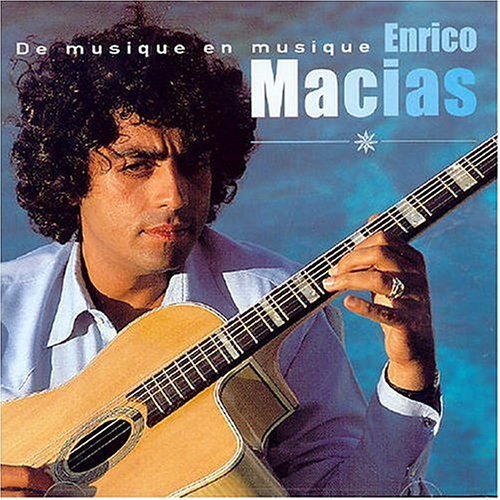
(Above: Enrico Macias)
Music is not the only reminder for Algerian Jews about their origin. Food also plays an important role in maintaining cultural distinction. Within my grandma’s French bubble in Israel, which included frequently serving endives salad, baguette avec beurre, Camembert cheese and apple tart (not to mention that TV-5 was almost always in the background), there was a special place for traditional dishes. Being located on the southern- western shores of the Mediterranean, the Jewish Algerian Cuisine is heavily influenced by the aromas of the Iberian Peninsula. The repopulation of the North African communities with Spanish and Portuguese refugees after the Spanish expulsion (beginning in the late 15th century) definitely added to this strong Iberian thread, which includes dishes, such as Merguez sausage, sautéed spinach with garbanzo beans, ground beef triangle pastels and fried fish. There are also classic North African dishes, such as Macbooba (burnt vegetable salad), honey dipped dough cigars, Mafroom (potato stuffed with ground beef) and, of course, Couscous (recipe ahead). Thus, in a nutshell, Algerian cuisine can be defined as Sephardic-Mediterranean kitchen with North African accents and a French touch.
And now for the Couscous. Algerian Jews are very particular about their couscous. They will never eat it in a restaurant, or out of the box, and refuse to even taste couscous made by Jews from other North African communities (i.e. Tunisian, Moroccan and Libyan Jews). Their couscous (and I am just echoing everything I heard growing up) is superb because its refined texture resembling tiny sand grains, its minimal seasoning (other than Merguez, Algerian cuisine is not spicy) and its perfectly cooked vegetables (not too mushy- not too hard). In other words, or as they put it themselves, it’s the French version of couscous! It is truly incredible how one dish can encapsulate so much attitude!
In their defense, the making of Algerian style couscous, the way my grandma and my mom cook it, is very laborious. In the few times, I made it myself I used shortcuts, such as substituting a food processor for manually sifting the grains over and over again. In addition to the rewarding nature of the process, the final result is very delicious and hearty. During Friday night dinners at my grandma house, everybody was waiting for this one dish, this white mountain decorated with colorful vegetables in an unassuming glass bowl. Despite the abundance of foods on the table, my grandma and my mother always had to go back to the kitchen to refill the bowl. These days I am glad to witness my young son devouring a plateful of my favorite semolina nosh.
Before finally handing the recipe, a couple of helpful notes:
A. Couscous is a seasonal dish. The cold winter months are ideal for filling your stomach with it.
B. Toppings may change. In my household, we served it with garbanzo beans, turnips, zucchinis and carrots. Hard boiled eggs are also a great addition. Some people like eating couscous with a zesty salad (shredded carrots in lemon) or raw vegetables (radishes) on the side.
C. Sauce is traditionally meat based. However, couscous is veggie friendly, and the sauce is delicious also in its vegetarian version.
D. Clear some time. This is not a quick recipe and even with shortcuts, the process of steaming and sifting the grains several times, is quite long even for experienced cooks.
E. The cooking of Couscous requires a special pot called a couscoussier, a traditional double-chambered steamer. For those who don’t have it, a pasta pot with a steamer or just placing a steamer or a colander on a regular pot should work as well.

(Above: My mother making couscous)
My Family Recipe for Couscous
Couscous Grains
Ingredients:
2.2 Ib. (1 kg) semolina (thick grain)
(About) 5 cups water
5 tbs. oil
1 tbs. salt
Directions:
-Fill a large pot with water and bring to a boil.
-Place semolina grains in a big fine mash strainer on top of a large bowl. Pour water over the grains (1 ½-2 cups) and knead the grains, so they will absorb the water. Then sift them through the strainer. Try as much as possible to avoid little balls. Use food processer if you are having difficulty in creating this fine texture.
-Put the grains in the steaming basket on top of the boiling water in the couscoussier (or your alternative pot), cover and cook on medium heat for 30 minutes.
-Remove from heat and place the grains in the strainer again on top of the bowl.
-Once you are done sifting, pour additional 3 cups of water, oil and salt.
-Mix the grains in the bowl and use hands to create tiny little grains.
-Put the grains back in the steaming basket and steam for additional 30 minutes.
-Pour the grains in in a bowl and let cool.
(Repeat the sifting and steaming process for a third time if the grains are too coarse).
Couscous Sauce
Ingredients:
3 cups of garbanzo beans soaked overnight
4 zucchini peeled and cut halfway through
4 carrots peeled and cut halfway through
3 small turnips quartered
2 lbs. meat – beef or lamb (optional)
3 bay leaves
Salt and Pepper
Directions:
-Layer ingredients in a big pot in the following order: garbanzo beans, meat, bay leaves and vegetables.
- Cover with water and bring to a boil on high heat.
- After 40 minutes reduce heat to simmer, add salt and pepper and cook for another 2 ½ to 3 hours until vegetables, meat and beans are soft but not too mushy. Remove bay leaves.

(Above: The different stages of the process)
For serving:
Place couscous grains in a bowl. Arrange vegetables, meat and beans on top and add one or two scoops of the sauce. Basically just to moisten the grains a little bit. Pour the rest of the sauce in a separate sauce for extras.
Bon Appetit!
0 notes
Text
#i put on paradise found in the background and - omg#how do people hate this episode i really don't understand#there's this thing about x/g that i love so much bc it hurts so good#that they love each other so much but it's not always enough#they see each other in pain - particularly x sees g in pain - and she KNOWS she can't help#both bc of who they are and the things holding them back as individuals and bc of the things they've been through together#*cough the rift cough*#that make it IMPOSSIBLE to get close enough or understand#there's always an ideological and traumatic barrier between them#and it gets bigger the longer they're together#and the longer and more they love each other#and they can't breach it#my god it's so good#it's SO GOOD#and to have all of that situated in this very sexy episode#with sexy wet wound tending and naked candlelit bath massages and oh i pulled a muscle let me undress you to rub it out massages#at the same time as xena is staring agonized at gabrielle bc she can't help and she knows it#at the same time xena is FREAKED OUT AS HELL about the violent part of her#and specifically the inevitable potential of it hurting gabrielle (again)#this episode is a lot!!!!#y'all!!!!#it's so fucking good!!!#and bc I'm MIFFED about it i'm gonna say again that if you're put off the WHOLE THING by xena's stupid hair and teeth at the very end#you are not watching this show correctly#and you're missing out on 90% of what it's doing#there i said what i said#and what i was too tired to say last night#xena
Tags by @tunemyart
Ok, I had to include Amy's tags in this reblog because genius.
But also, YES YES YES. Paradise Found is fantastic! I love it. I LOVE IT. AND NOT JUST BECAUSE IT’S SO FUCKING SEXY. It's just such a brilliant inflection point in S4. Like, on a practical level, it acts as the pivot between the first and second halves of the season, introducing us to the India arc and setting in motion events that will lead Xena and Gabrielle to that Roman garrison, and their beautiful, violent breaking points. But, on a narrative level it’s also a much needed and important aside - a brief reprieve from the rising action of the season’s main arc; a moment of stillness.
I mean, this episode doesn’t even try to hide from itself! It very plainly tells us what it’s doing - Gabrielle lays it out in the teaser: “instead of reaching out maybe we should be looking in.” Not that the show ever shied away from confronting the devastating reality of Xena’s and Gabrielle’s lives, or the enduring torment of the trauma they’ve suffered! It’s very consistent - and earnest - in its exploration of their emotional and spiritual and psychological struggles.
But Paradise Found is one of the few episodes where the story is given over almost entirely to sustained reflection, and Xena and Gabrielle - alongside the audience - are allowed the time and space to confront the extent of their suffering, and to dwell in the personal anguish that each carries. And in so doing, it brings into sharp, agonizing relief the driving emotional conflict(s) of the season (and a sizable chunk of the series tbh). It’s a meditation on grief and sorrow and purpose and love, and ugh, it’s soooooo good. And also sexy, yes! Sexy!!!
And then there’s feral!Xena. Can we please talk about her? I love her. I love all the layers of meaning in her. I love what she represents, you know, beyond what the episode tells us, which is that she is the realization of Xena’s true self; her darkness given form. An amalgam of those ugly traits and uninhibited impulses that make her dangerous and destructive, that make her vile and inhuman, that make her unworthy and unsympathetic.
But there’s more to it than that! More nuance. Feral!Xena is more than just a caricature of Xena’s dark side! More than just how others view her. Feral!xena is very specifically a reflection of how Xena still views herself, what she sees when she looks inwards. And, maybe more importantly, what she fears Gabrielle will come to see in her too, what she might yet become once more - a grotesque monster that will be Gabrielle’s ruin in the end (and again here! The brilliance! The parallels! Gabrielle calling herself a monster. Xena becoming one. There is so much they share!)
Feral!Xena is Xena’s psyche made flesh, both in the context of the series’ arc and, more specifically, in the context of the season’s. She is the embodiment of everything Xena hates about herself, but also a manifestation of how she’s been feeling since she thought Gabrielle had died - desperate, restless, terrified, unhinged. Xena isn’t reduced to feral!Xena because she’s inherently evil, she’s reduced to her because she’s emotionally compromised (BUT THEN, ISN’T THAT WHAT THE SHOW HAS BEEN TELLING US ABOUT XENA ALL ALONG?!?) - because she’s feral with fear and guilt and helplessness. She becomes like a crazed animal because on some level that’s how she’s been made to feel as circumstances seemingly beyond her control force her ever-steadily into a corner...
HOLY SHIT. LIKE. THIS EPISODE!!!
Then there’s the foreshadowing/parallelism - whether it was intentional or not - of what is to come in India, and what is to come in Ides! Because, broadly speaking, Gabrielle’s dalliance with Aidan’s philosophies, and her ultimate rejection of the inner peace he claims his beliefs offer, is a warm-up for what will happen with Eli. Of course, Aidan and Eli start from very different places, in terms of their motivations and intentions, but nevertheless they both seek to pacify Gabrielle with their respective ideologies (not that she isn’t willing!), and they both fail in the face of Gabrielle’s love for, and desire to save Xena.
The way Gabrielle snaps out of her serenity-now stupor and breaks free of Aidan's influence to protect Xena from the spiritual harm of taking an innocent life is such a poignant mirror (stepping stone!) to the way she ultimately snaps in Ides, categorically abandoning the Way of Love to protect Xena once again, this time from brutal, physical harm!!! Both moments are eye-opening for Gabrielle - literally and figuratively - and once she sees, there's only one choice for her.
But then, there’s only ever been one choice for her!!! And there will only ever be that one choice for her. Which isn’t a new revelation for Gabrielle - it is a part of her as surely as the marrow in her bones. But, even though Gabrielle has been choosing Xena since the moment she laid eyes on her, there’s still some reticence there on her part - and Xena’s too - to follow that choice through to its natural conclusion.
And here, a momentary aside, but I think that reticence is born of Gabrielle’s own misguided sense of who she ought to be - both for herself and for others, especially Xena! Now, I’m not saying Gabrielle thinks she’s beyond reproach, only that she’s carrying around a lot of expectations, some self-imposed, some put upon her by others. Much of how she views herself is influenced by how those around her perceive her, especially Xena - which is often in a highly idealized way - and by S4 she’s internalized a lot of those attitudes about herself, for better or for worse. Not that there isn’t merit in some of the ways she’s been lauded, but she’s been so focused on being a counterbalance to Xena’s darker instincts that both she and Xena have unwittingly gotten stuck in a mindset (though, for different reasons) that’s creating this impossible tension in their relationship. And sooner or later, it’s not enough to just choose Xena. It’s all or nothing, and Gabrielle cannot be without Xena, so it must be all.
Ugh, that’s what I love about S4! It really is just one long, heartbreakingly, glorious surrender for both Xena and Gabrielle - a surrender to their deepest fears and to the truths of who they are and just what they’re capable of and to their transcendent love. A surrender to the inevitability of the all. And, Paradise Found ushers in that last painful contraction (the India arc and The Way of Love and the increasing incompatibility of their life together) before Gabrielle’s explosive rebirth in Ides, when she finally realizes where her true path lies and how she is meant to walk it (not that she still won’t struggle from time to time with her choices! Ides takes a brush to the slate, but it doesn’t leave it perfectly clean, the painful shapes and shadows of some decisions are still there to tug at hearts and minds. But, like, don’t get me started on Ides.)
Anyway, I adore this fucking show. K, thanks for reading.
I’m feeling a whole S4 rewatch comin on…
#xena#xena warrior princess#xena and gabrielle#S04E13 Paradise Found#opt: for i am dying of such love
54 notes
·
View notes